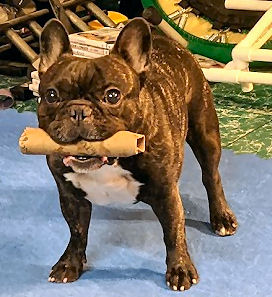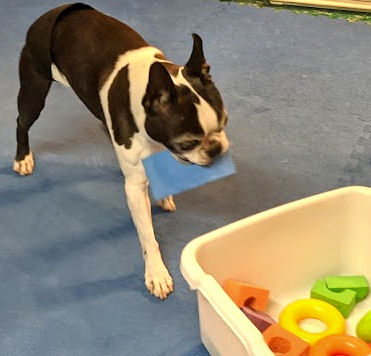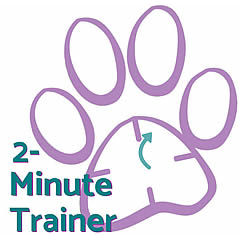
We’re always surprised when people we assume are “dog people” don’t play dog training games regularly. It’s great for both dogs and people and so much a part of our lives that we sometimes forget that not everybody is convinced. Even people we thought would be on board.
Our dog obedience club rents space at a doggy day care in the area. The timing overlaps a bit with the daycare operation, so we’ve gotten to know some of the employees. This week Hope was showing a dog training game video to one who claims to be a dog trainer. She was shocked when he asked “Why do you bother with that?”
The why of it all
It’s a valid question. Why do we bother with dog training games? There are so many reasons it’s difficult to list them all, but here are the top 10:
Reasons to play dog training games:
- It’s fun. Especially if you stick to the time limits. We call it 2-Minute-Dog-Training, but we usually stretch it to five, since we get to play with our dogs. Once you start playing, and see how much the dog enjoys it, how much they can learn, and how eager they are to play, it’s addictively fun.
- It grows your relationship with your dog. Some dogs may be a bit aloof, or more independent. Even these dogs become better companions through dog training games. They look to their people for direction, for feedback, and for rewards, be it a tidbit or food, a scratch, or a “good dog!”
- You evolve into a better teacher. When you realize that your dog, who doesn’t speak your language, is learning what you’re teaching, it’s a revelation. You’re able to connect, even without a common tongue.
- Your patience grows. We’ve talked before about how hard it is to just wait and do nothing while your dog tries to figure something out. Doing nothing to “help” is tough. But growing your patience with dog training helps your relationships with people, too.
- Your dog, and you, both learn to be better problem solvers. Just the practice of breaking things down into small steps helps change your approach to almost any problem. Seeing the trees, as well as the forest, helps you develop workable solutions.
- Dog training games require lots of dog energy. Thinking is hard work for your dog. It’s fun, but it does require focus and concentration, which are tiring. A few minutes playing dog training games is as tiring for your dog as miles of walking, or a half hour of “fetch.” Even high-energy dogs usually need a nap after an intense dog training game.
- Training games add variety to your dog’s life. You don’t play the same game every day. There’s always the excitement of anticipation for your dog when you start a session – “What will we play today?” Even if you play more than once a day (you should!), it’s never the same game twice in a row.
- You learn your dog’s preferences, strengths, and weaknesses. Some dogs love “finding” stuff. Others love carrying things. Or it may be a combination, like “hide and seek,” or “put your toys away.” And they have particular favorites: Booker loves “putting away” soft foam blocks. Torque prefers cardboard tubes.
- You and your dog become more creative. You can make up games that only you and your dog know the rules for. We noticed that Simon loves stacking things in the bin when he plays “put your toys away.” So we’ve started a new Simon game – stack the blocks.
- Playing dog training games enriches both your lives. Sure, you could sit on the couch and watch TV together. And that’s fun, too. But it’s even better after a short, fun, dog training game session. Because you did something good for both of you, enjoyed each other’s company, gained respect for your dog’s capabilities, and shared your commitment to each other.
Get up and play

Frankly, we don’t know why anyone wouldn’t play dog training games. In addition to all the other stuff, the videos are fun to watch – whether you’re remembering what a good time you had, or showing off your dog’s skills to someone else.
We think everyone with a dog should commit a few minutes a day to giving attention to their dog. While it’s understandable to skip a day here and there, a 2-Minute Dog Training Game is a minimal ask. And if someone isn’t willing to focus on their dog a couple minutes a day, we wonder why they have a dog at all.






